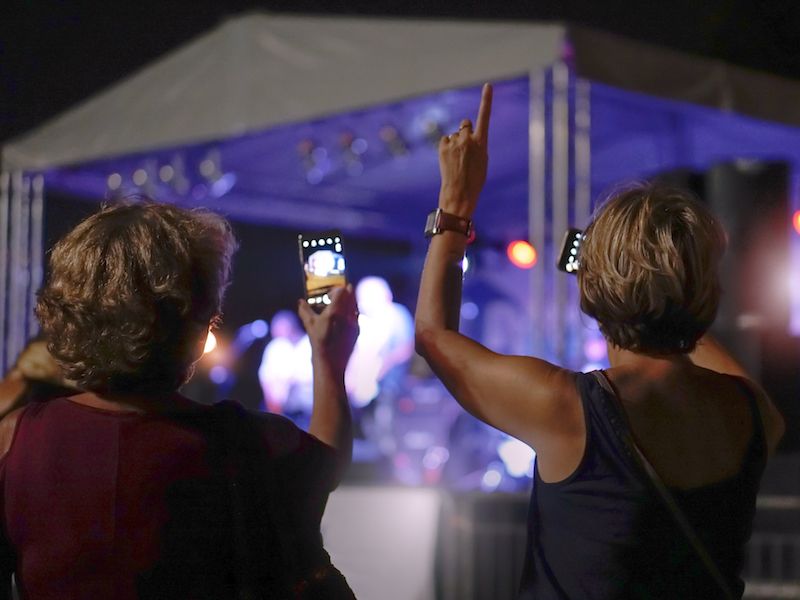
Summer has finally arrived, and you’re ready for all that fun we’ve been getting excited about: swimming in the pool, going to the beach, and other activities that could damage your ears. That’s right, summer has a few hidden risks to your ears, either from loud noises or the environmental scenarios you may find yourself in. Any noises above 80 decibels can result in harm to your hearing, while permanent hearing loss can happen in pools or other bodies of water. You have to take preventative measures and be mindful of your surroundings so that you can safeguard your hearing this summer season. Read on to identify the summer’s 6 hidden risks to your hearing.
At Concerts, Use Ear Protection
Whether you’re at an indoor stadium or an outdoor concert venue you still need to use ear protection during concerts. Live music can reach that are over 90 decibels, even at outside concerts, which is inside the danger zone of hearing loss. That’s the reason why it’s definitely a good plan to use earplugs regardless of whether you’re seeing a show outdoors or indoors. Earplugs reduce the sound while still allowing you to hear and get into the music. If you’re bringing young kids to a show, think about buying them a heavy duty pair of earmuffs since their ears are much more delicate than those of adults.
Fireworks Can Damage Your Ears
Honestly, there are a lot of reasons to avoid fireworks in the summer. It’s not only the 4th of July shows that are professional that can harm your ears, we mean the backyard fireworks which every summertime cause many of injuries. In addition to causing hand injuries, loss of vision, and house fires, personal fireworks can also cause significant damage to your ears since they’re known to get to volume levels of 155 dB. This year, on the 4yh of July, enjoy the show from a little further away and leave the fireworks to the professionals.
Hearing Loss Can be Caused by Lawnmowers
If you’re really serious about your lawn, it’s likely that you’re out there every week on your lawnmower, trimming your bushes and using your edger. But the muffled sensation in your ears is an indication that your ears have been injured. That’s because the lawn tools, which are constantly loud, have a slow and steady impact on your hearing. If you’ve ever noticed lawn care pro’s, you probably have noticed them wearing ear protection, next time you do yard work with noisy power equipment, you need to take a hint from them and use earplugs or earmuffs.
Beaches And Pools, What You Need to do to Safeguard Your Hearing
Huge numbers of people suffer from swimmer’s ear each summer, which occurs when the ear canal traps water which has to much bacteria. Swelling and painful earaches are the result when the bacteria infects the ear. It’s not exclusively lakes and rivers that contain these bacteria, they can also be found in hot tubs and pools if they are not cleaned and treated properly. No lasting injury should take place if you have your hearing checked out by a hearing expert. To prevent swimmer’s ear, though, you will want to wear special swimming earplugs in the pool and have your pool water analyzed to be sure the chemical balance is safe.
Boats and Other Water Sports
The summer season is a taste of freedom for those who enjoy being in a boat on the water, smelling the salt air of the ocean or the fresh breeze of the lake. But, boat and jet ski engines can be loud,we’re talking over 100 decibels. Lasting hearing injury can happen after only 15 minutes of exposure to that kind of noise. In this case also, wearing a set of disposable foam earplugs is a smart plan.
Your Ears Can be Hurt by Car Races
It doesn’t matter what type of auto racing you love, midget, Formula 1, drag racing, motorcycle Formula 1. Every one of them can cause a huge issue for your hearing if you go to race after race this summer season. It’s calculated that volume levels can go beyond 120 decibels at many races, which is absolutely in the danger zone for hearing impairment. Earplugs are your best bet at these races, although your kids should definitely wear the earmuffs which were mentioned earlier. If not, you might not be able to enjoy the sound of those engines as you get older.
